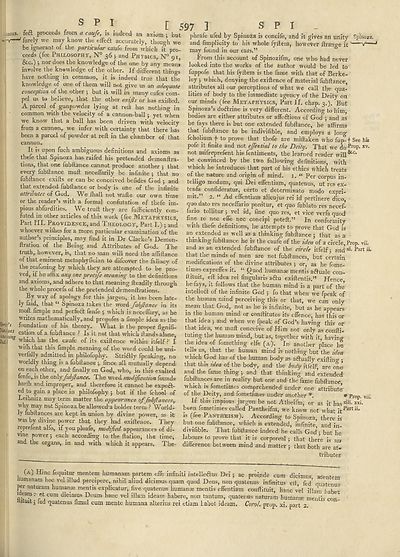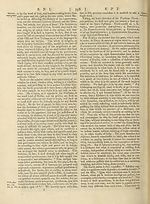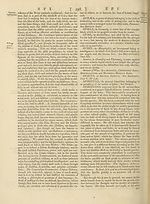Encyclopaedia Britannica, or, a Dictionary of arts, sciences, and miscellaneous literature : enlarged and improved. Illustrated with nearly six hundred engravings > Volume 19, Scripture-SUG
(647) Page 597
Download files
Complete book:
Individual page:
Thumbnail gallery: Grid view | List view

S P I
. uoza,
Her ’i
ues
'one ting
feft proceeds from a caufe, is indeed an axiom ; but
- furely we may know the effeft accurately, though we
be ignorant of the particular caufe from which it pro¬
ceeds (fee Philosophy, N° 36 ; and Physics, N° 91,
&c.) j nor does the knowledge of the one by any means
involve the knowledge of the other. If different things
have nothing in common, it is indeed true that the
knowledge of one of them will not give us an adequate
conception of the other ; but it will in many cafes com¬
pel ns to believe, that the other exijls or has exifled.
A parcel of gunpowder lying at reft has nothing in
common with the velocity of a cannon-ball j yet when
we know that a ball has been driven with velocity
from a cannon, we infer with certainty that there has
been a parcel of powder at reft in the chamber of that
cannon.
It is upon fuch ambiguous definitions and axioms as
thefe that Spinoza has raifed his pretended demonftra-
tions, that one fubftance cannot produce another ; that
every fubftance muft neceifarily be infinite ; that no
fubftance exifts or can be conceived befides God ; and
that extended fubftance or body is one of the infinite
attributes of God. We fhall not wafte our own time
or the reader’s with a formal confutation of thefe im¬
pious abfurdities. We truft they are fufficiently con¬
futed in other articles of this work (fee Metaphysics,
Part HI. Providence, and Theology, Part I.) 5 and
whoever willies for a more, particular examination of the
author’s principles, may find it in Dr Clarke’s Demon-
ftration of the Being and Attributes of God. The
truth, however, is, that no man will need the aftiftance
of that eminent metaphyfician to difeover the fallacy of
the reafuning by which they are attempted to be pro¬
ved, if he affix any one precife meaning to the definitions
and axioms, and adhere to that meaning fteadily through
the whole procefs of the pretended demonftrations.
By way of apology for this jargon, it has been late¬
ly laid, that u bpinoza takes the word fubjlance in its
moft limple and perfect fenfe •, which is neceflary, as he
writes mathematically,and propofes a fimple idea as the
foundation of his theory. What is the proper fignifi-
cation of a fubftance ? Is it not that which Hands alone,
which has the caufe of its exiftence within itfelf ? I
wi(h that this fimple meaning of the word could be uni-
verfally admitted in philofophy. Stri6Ily fpeaking, no
worldly thing is a fubftance •, fince all mutually depend
on each other, and finally on God, who, in this exalted
fenfe,.is the only fubjlance. The word modification founds
harffi and improper, and therefore it cannot be expedb-
ed to gain a place in philofophy ; but if the fchool of
Leibnitz may term matter the appearance of fubfancesy
why may not Spinoza be allowed a bolder term ? World¬
ly fubftances are kept in union by divine power, as it
was by divine power that they had exiftence. They
reprefent alfo, if you pleafe, modified appearances of di¬
vine power; each according to the ftation, the time,
and the organs, in and with which it appears. The
C 597 1
S P I
phrafe ufed.by Spinoza is concife, and it gives an unity Spinoza.
and fimplicity to his whole fyftem, however ftrange it ^
may found in our ears.”
From this account of Spinozifm, one who had never
looked into the works of the author would be led to
fuppofe that bis fyftem is the fame with that of Berke¬
ley ; which, denying the exiftence of material fubftance,
attributes all our perceptions of what we call the qua¬
lities of body to the immediate agency of the Deity On
our minds (fee Metaphysics, Part II. chap. 3.). But
Spinoza’s dodfrine is very different. According to him,
bodies are either attributes or affedlions of God 5 and as
he fays there is but one extended fubftanee, he affirms
that fubftance to be indivifible, and employs a long
fcholium f to prove that thofe are miftaken who fup-f See hi*
pofe it finite and not ejfential to the Deity. That we do f>roP- xv*
not mifreprefent his fentiments, the learned reader will&'c‘
be convinced by the two following definitions, with
which he introduces that part of his ethics which treats
of the nature and origin of mind. 1. “ Per corpus in-
telligo modum, qui Dei effentiam, quatenus, ut res ex-
tenfa confideratur, certo et determinato modo expri-
mit.” 2. “ Ad effentiam alicujus rei id pertinere dico
quo dato res neceffario ponitur, et quo fublato res necef-
fano tollitur 5 vel id, fine quo res, et vice verfa quod
fine re nec efle nec concipi poteft.” In conformity
ivith thefe definitions, he attempts to prove that God is
an extended as well as a thinking fubltance ; that as a
thinking fubftance he is the caufe of the idea of a circle, Prop. viL
and as an extended fubftance of the circle itfelf; and xi- Part ii.
that the minds of men are not fubftances, but certain
modifications of the divine attributes ; or, as he fi.me-
tiines expreffes it.. “ Quod humanse mentis aauale con-
ftituit, eft idea rei fingularis a&u exiftentis.” Hence,
he fays, it follows that the human mind is a part of the
intellect of the infinite God ; fo that when we fpeak of
the human mind perceiving this or that, we can only
mean that God, not as he is infinite, but as he appears
in the human mind or conrtitutes its offence, has this or
that idea j and when we fpeak of God’s having this or
that idea, we muft conceive of Him not only as confti-
tuting the human mind, but as, together with it, having
the idea of fomething elfe (a). In another place he
tells us, that the human mind is-nothing but the idea
which God has of the human body as actually cxiftino-;
that this idea of the body, and the body itfelf, are one
and the fame thing j and that thinking and extended
fubftances are in reality but one and the fame fubftance,
which is fometimes comprehended under one attribute
of the- Deity, and fometimes under another *. * Prop. vh.
If this impious jargon be not Atheifm, or as it has xiii-xxi-
been fometimes called Pantheifm, we know not what itPartii*
is (fee Pantheism). According to Spinoza, there is
but one fubftance, which is extended, infinite, and in¬
divifible. That fubftance indeed he calls God ; but he
labours to prove that it is corporeal ; that there is no
difference between mind and matter j that both are at¬
tributes
, < Hl"c fequ‘tur mentem humanam partem effe infir.iti intelledhis Dei; ac proinde cum dicimus mentem
numanam hoc vel illud percipere,. nihil aliud dicirous quam quod Deus, non quatenus infinitus eft, fed’ nuatenu-
per naturam humanse mentis explicatur, five quatenus humanae mentis effentiam conftituit, bane vel illam habe*-
et-cum dieimus Deum hanc vel illam ideam habere, non tantum, quatenus naturam humanse mentis con~
Utuit; led quatenus fimul cum mente humana alterius rei etiam kabet ideam. Carol, prop. xi. part 2.
. uoza,
Her ’i
ues
'one ting
feft proceeds from a caufe, is indeed an axiom ; but
- furely we may know the effeft accurately, though we
be ignorant of the particular caufe from which it pro¬
ceeds (fee Philosophy, N° 36 ; and Physics, N° 91,
&c.) j nor does the knowledge of the one by any means
involve the knowledge of the other. If different things
have nothing in common, it is indeed true that the
knowledge of one of them will not give us an adequate
conception of the other ; but it will in many cafes com¬
pel ns to believe, that the other exijls or has exifled.
A parcel of gunpowder lying at reft has nothing in
common with the velocity of a cannon-ball j yet when
we know that a ball has been driven with velocity
from a cannon, we infer with certainty that there has
been a parcel of powder at reft in the chamber of that
cannon.
It is upon fuch ambiguous definitions and axioms as
thefe that Spinoza has raifed his pretended demonftra-
tions, that one fubftance cannot produce another ; that
every fubftance muft neceifarily be infinite ; that no
fubftance exifts or can be conceived befides God ; and
that extended fubftance or body is one of the infinite
attributes of God. We fhall not wafte our own time
or the reader’s with a formal confutation of thefe im¬
pious abfurdities. We truft they are fufficiently con¬
futed in other articles of this work (fee Metaphysics,
Part HI. Providence, and Theology, Part I.) 5 and
whoever willies for a more, particular examination of the
author’s principles, may find it in Dr Clarke’s Demon-
ftration of the Being and Attributes of God. The
truth, however, is, that no man will need the aftiftance
of that eminent metaphyfician to difeover the fallacy of
the reafuning by which they are attempted to be pro¬
ved, if he affix any one precife meaning to the definitions
and axioms, and adhere to that meaning fteadily through
the whole procefs of the pretended demonftrations.
By way of apology for this jargon, it has been late¬
ly laid, that u bpinoza takes the word fubjlance in its
moft limple and perfect fenfe •, which is neceflary, as he
writes mathematically,and propofes a fimple idea as the
foundation of his theory. What is the proper fignifi-
cation of a fubftance ? Is it not that which Hands alone,
which has the caufe of its exiftence within itfelf ? I
wi(h that this fimple meaning of the word could be uni-
verfally admitted in philofophy. Stri6Ily fpeaking, no
worldly thing is a fubftance •, fince all mutually depend
on each other, and finally on God, who, in this exalted
fenfe,.is the only fubjlance. The word modification founds
harffi and improper, and therefore it cannot be expedb-
ed to gain a place in philofophy ; but if the fchool of
Leibnitz may term matter the appearance of fubfancesy
why may not Spinoza be allowed a bolder term ? World¬
ly fubftances are kept in union by divine power, as it
was by divine power that they had exiftence. They
reprefent alfo, if you pleafe, modified appearances of di¬
vine power; each according to the ftation, the time,
and the organs, in and with which it appears. The
C 597 1
S P I
phrafe ufed.by Spinoza is concife, and it gives an unity Spinoza.
and fimplicity to his whole fyftem, however ftrange it ^
may found in our ears.”
From this account of Spinozifm, one who had never
looked into the works of the author would be led to
fuppofe that bis fyftem is the fame with that of Berke¬
ley ; which, denying the exiftence of material fubftance,
attributes all our perceptions of what we call the qua¬
lities of body to the immediate agency of the Deity On
our minds (fee Metaphysics, Part II. chap. 3.). But
Spinoza’s dodfrine is very different. According to him,
bodies are either attributes or affedlions of God 5 and as
he fays there is but one extended fubftanee, he affirms
that fubftance to be indivifible, and employs a long
fcholium f to prove that thofe are miftaken who fup-f See hi*
pofe it finite and not ejfential to the Deity. That we do f>roP- xv*
not mifreprefent his fentiments, the learned reader will&'c‘
be convinced by the two following definitions, with
which he introduces that part of his ethics which treats
of the nature and origin of mind. 1. “ Per corpus in-
telligo modum, qui Dei effentiam, quatenus, ut res ex-
tenfa confideratur, certo et determinato modo expri-
mit.” 2. “ Ad effentiam alicujus rei id pertinere dico
quo dato res neceffario ponitur, et quo fublato res necef-
fano tollitur 5 vel id, fine quo res, et vice verfa quod
fine re nec efle nec concipi poteft.” In conformity
ivith thefe definitions, he attempts to prove that God is
an extended as well as a thinking fubltance ; that as a
thinking fubftance he is the caufe of the idea of a circle, Prop. viL
and as an extended fubftance of the circle itfelf; and xi- Part ii.
that the minds of men are not fubftances, but certain
modifications of the divine attributes ; or, as he fi.me-
tiines expreffes it.. “ Quod humanse mentis aauale con-
ftituit, eft idea rei fingularis a&u exiftentis.” Hence,
he fays, it follows that the human mind is a part of the
intellect of the infinite God ; fo that when we fpeak of
the human mind perceiving this or that, we can only
mean that God, not as he is infinite, but as he appears
in the human mind or conrtitutes its offence, has this or
that idea j and when we fpeak of God’s having this or
that idea, we muft conceive of Him not only as confti-
tuting the human mind, but as, together with it, having
the idea of fomething elfe (a). In another place he
tells us, that the human mind is-nothing but the idea
which God has of the human body as actually cxiftino-;
that this idea of the body, and the body itfelf, are one
and the fame thing j and that thinking and extended
fubftances are in reality but one and the fame fubftance,
which is fometimes comprehended under one attribute
of the- Deity, and fometimes under another *. * Prop. vh.
If this impious jargon be not Atheifm, or as it has xiii-xxi-
been fometimes called Pantheifm, we know not what itPartii*
is (fee Pantheism). According to Spinoza, there is
but one fubftance, which is extended, infinite, and in¬
divifible. That fubftance indeed he calls God ; but he
labours to prove that it is corporeal ; that there is no
difference between mind and matter j that both are at¬
tributes
, < Hl"c fequ‘tur mentem humanam partem effe infir.iti intelledhis Dei; ac proinde cum dicimus mentem
numanam hoc vel illud percipere,. nihil aliud dicirous quam quod Deus, non quatenus infinitus eft, fed’ nuatenu-
per naturam humanse mentis explicatur, five quatenus humanae mentis effentiam conftituit, bane vel illam habe*-
et-cum dieimus Deum hanc vel illam ideam habere, non tantum, quatenus naturam humanse mentis con~
Utuit; led quatenus fimul cum mente humana alterius rei etiam kabet ideam. Carol, prop. xi. part 2.
Set display mode to:
![]() Universal Viewer |
Universal Viewer | ![]() Mirador |
Large image | Transcription
Mirador |
Large image | Transcription
Images and transcriptions on this page, including medium image downloads, may be used under the Creative Commons Attribution 4.0 International Licence unless otherwise stated. ![]()
| Permanent URL | https://digital.nls.uk/192703693 |
|---|
| Attribution and copyright: |
|
|---|
| Description | Ten editions of 'Encyclopaedia Britannica', issued from 1768-1903, in 231 volumes. Originally issued in 100 weekly parts (3 volumes) between 1768 and 1771 by publishers: Colin Macfarquhar and Andrew Bell (Edinburgh); editor: William Smellie: engraver: Andrew Bell. Expanded editions in the 19th century featured more volumes and contributions from leading experts in their fields. Managed and published in Edinburgh up to the 9th edition (25 volumes, from 1875-1889); the 10th edition (1902-1903) re-issued the 9th edition, with 11 supplementary volumes. |
|---|---|
| Additional NLS resources: |
|

